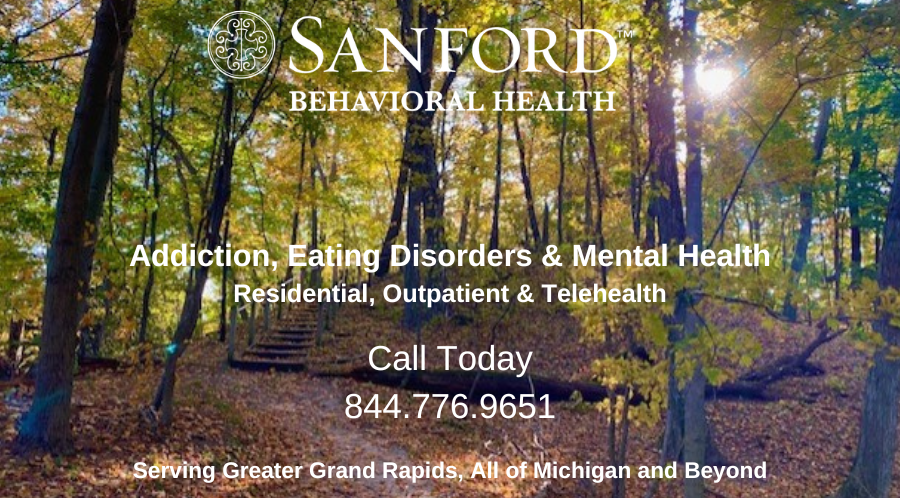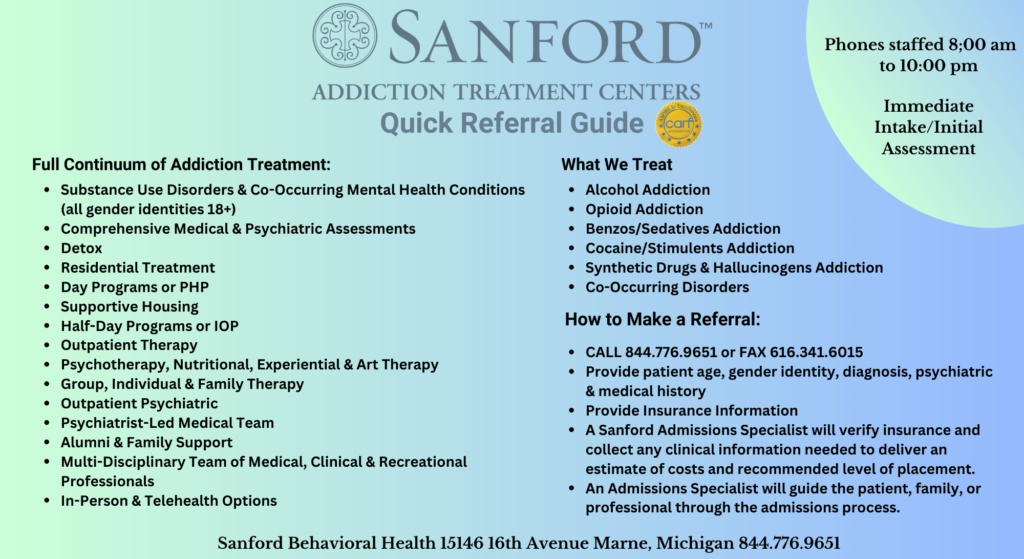Admissions Specialists – The First Voice You Hear – Limelight Interview
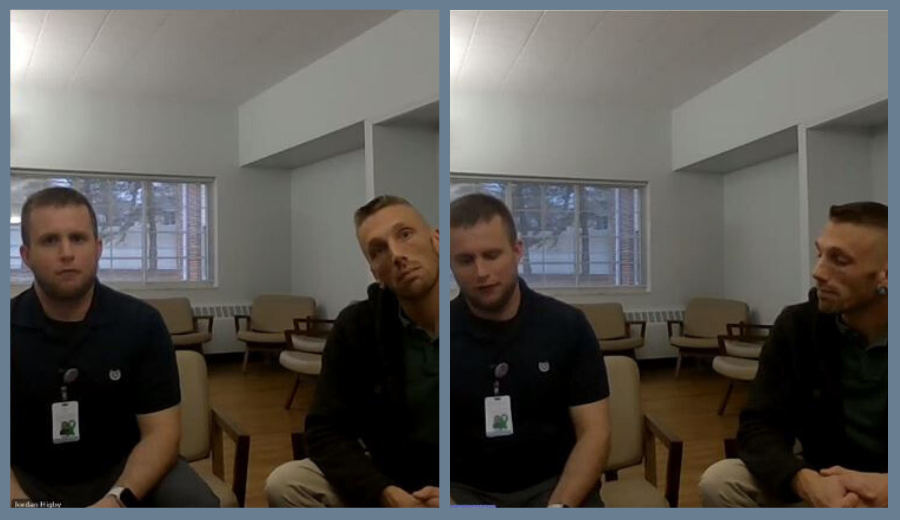
Aaron Marshall and Jordan Higby in the Limelight Interview
The phrase “dream team” is overused for a reason. It simply describes people who do their jobs well, work well together, and are the kind of folks you would like to have lunch with. They make an organization better. Admissions Specialist Aaron Marshall and Lead Admissions Specialist Jordan Higby are that kind of team, although they are also accomplished individually. As the first voice you hear when you call Sanford Behavioral Health, our dream team members go a long way toward reducing the fear and stigma of getting treatment for a substance use disorder.
“The best gift you can give a family member is the fact that you’re alive and sober. I remember my dad telling me the best thing for him is to go to sleep at night and not worry if I am dead or alive. That is the greatest gift I can give.” Jordan Higby, Sanford Behavioral Health Admissions Specialist
Admissions Specialists – The First Voice You Hear
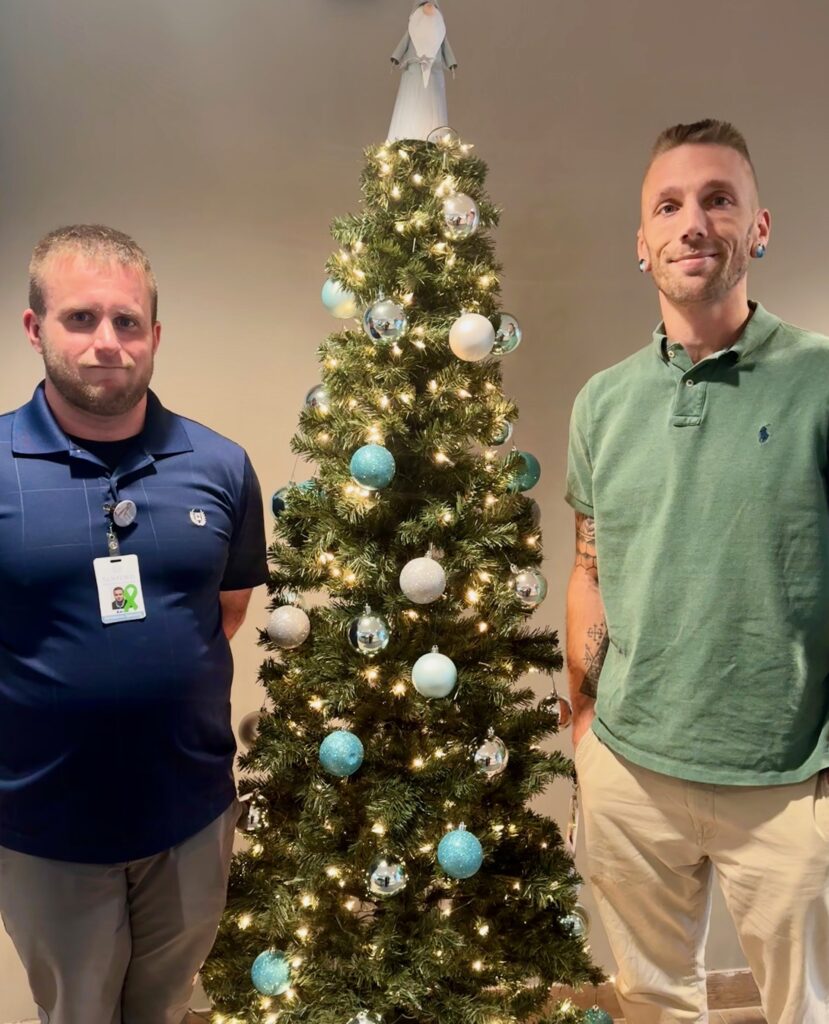
Giving the best gift for the holidays and beyond. Aaron Marshall and Jordan Higby at Sanford West Behavioral Health Campus.
Both Aaron and Jordan are in recovery, which means they can empathize with and manage just about every crisis they deal with on a daily basis. We sat down with them over the holidays to talk about recovery, the excuses they hear, laughter in the hallways, and their tireless endeavors to get people the help they need.
SBH – Please describe your job.
Aaron Marshall – Our primary role is bridging the gap between someone needing treatment and receiving treatment. We are the liaison, so if you are a family member or a person in need and call, you get one of us [or another team member] on the phone. We walk you through the steps to the admissions door. I try to meet with every person I have spoken to when they arrive at Sanford Behavioral Health. Because I have built a rapport, it makes them feel like they know someone – it’s not so scary coming through those doors.
Jordan Higby – We do build rapport with patients on the phone, especially with the length of time it takes to get people to commit to treatment. We’re talking to people for weeks, sometimes months, before they finally decide to come in for detox and treatment. We have one patient who is here now that Aaron and I spoke with every weekend for the past year. Every Sunday, they made multiple phone calls – probably after an incident on the weekend. But this person finally made it, and they are doing the full continuum of care at Sanford.
SBH – What are the excuses you hear?
Jordan Higby – All right, we’ll rattle them off for you. We’ve got a list.
Aaron Marshall – I’ve got to work. I can’t lose my job – that’s a big one. Sometimes, people are the sole caregivers of a parent and have to be home to take care of them. It’s about not knowing how to handle things in their personal life to get here.
Jordan Higby – Childcare, and who’s going to take care of my animals? Cost is a perceived barrier to picking up the phone. School – I cannot take time away from school. Continuing to pay the bills while in treatment can also be a roadblock. However, we have ways of working around that through short-term disability and the FMLA. That way, their job is secure, and they get some income. (The Family and Medical Leave Act (FMLA) entitles eligible employees of covered employers to take unpaid, job-protected leave for specified family and medical reasons.)
SBH – These seem like legitimate barriers to getting treatment. How do you keep the conversation going?
Aaron Marshall – Well, we begin to troubleshoot with the person. We start investigating if they have any family members or a support system that can help. We look at insurance options. The person might not even realize that they have resources available to them. We help them figure out what the options are and get to a solution.
Jordan Higby – Often, these are just excuses. Because ultimately, getting treatment is the most important decision a person can make. If childcare is an excuse, they are often lucky to still have their children. If they keep going down this road, they will eventually lose the things they say are important.
Aaron Marshall – [Smiles] I can relate because I knew for years I needed to get “this” under control. I was that patient who was unwilling to do the work, so I’m familiar with people arguing with me.
SBH – You are both in recovery. How does that benefit someone who calls the admissions specialists at Sanford Behavioral Health?
Jordan Higby – Understanding. We understand what they’re going through. We understand the things that they are ashamed of and what they are putting their families through. And we’ve seen the other side of it. We have seen what treatment for mental health disorders can do. Both of us have done inpatient treatment, and we’ve seen how that can change our lives. So, for us to have that understanding can be comforting to the patient. We don’t always open up about those things, but there are situations where talking about our recovery builds a relationship.
Aaron Marshall – For me, it is endless compassion. I know how lonely and isolated active addiction feels. You can call me and say you have a problem with a substance, and you don’t have to tell me anything more because I already know. It also helps with the prescreen because they feel less afraid about opening up. They know I am not going to judge.
SBH – Talk about meeting Sanford’s clients for the first time.
Aaron Marshall – It’s nice because I’m in nursing school, so I work on the weekends a lot. I’ll meet the family when they get here and answer questions. I also talk to them about the continuum of care and what the long-term options are. I want them to leave with the sense that their loved one is in good hands and they’re going to be okay because everybody is terrified – it is crisis mode.
Jordan Higby – There are times when you can anticipate there might be problems, especially if a patient is resistant. If I meet them in person, I can prepare families on what to expect if their loved one wants to leave against medical advice and how to handle that phone call.
SBH – You guys have been at Sanford for years and seem to like each other. What is fun about your job?
Aaron Marshall – For me, it is about those patients that come in that we’re skeptical about. And then they end up staying, and we see the change and hope in their eyes. All of a sudden, they have color in their face, and they’re talking. I walk through the hallways, and I can hear them laughing. You know, those authentic belly laughs. Nothing makes me happier; I don’t even have to be a part of the conversation. I hear the hope in their voices. That is the best thing about what we do. That’s what keeps me in the business! I know they’re safe, and something’s clicking.
Jordan Higby – To be honest, I love it when it’s chaotic. I like making it work, whatever I have to do to make sure that the job gets done and that we help patients. I am excited when someone calls us in a panic, and we can get them in very quickly – within hours. It’s a rush when you get that call, and it’s a family member in crisis, and their loved one needs treatment. I can say, “We have an open bed, and we can take your health insurance. Bring them in right now.” When that happens, I know I played a part in impacting someone’s life for the better. I know they are alive and safe.
SBH – What about the challenging part?
Jordan Higby – Not being able to help people. But one of the great things about Sanford is that even if we’re not the place for you, we’re going to help you find the place that is. We have a lot of contacts in other facilities, and we will set up an introduction to someone we trust. We work closely with the business development team, and they also give us the names of reputable treatment centers to refer to.
Aaron Marshall – Two things. First, when my hands are tied, and I cannot get help for a person for whatever reason. Second is when we do all this leg work to get them help at Sanford, and a day later, they’re gone. If they leave AMA, it weighs on you because you feel like you’ve gotten to know this person and their family. If they ride it out, the feeling is going to pass.
SBH – You have mentioned the family; what are the concerns you hear from family members?
Aaron Marshall – The families are super anxious. They want to know what kind of treatment their loved one is going to get. This gives us an opportunity to walk them through what is going to happen step by step. In a way, we “sell” our program. But I know that it works, so I like talking about the fact we do not have a cookie-cutter program; we investigate what makes each person tick.
Jordan Higby – One of my favorite quotes is, “There are many paths to the top of the mountain, but the view is always the same.” I don’t care that your recovery doesn’t look the same as mine and vice versa as long as the result is the same. We try to find out what works for each patient.

Comfort, safety, and community at Sanford West Behavioral Health Campus
Please talk about how you address co-occurring mental health conditions.
Aaron Marshall – I like our emphasis on mental health support. Having a psychiatrist like Dr. Masterson leading the medical team helps because we have a plan to address mental health needs, not just getting someone detoxed or sober. They want something that’s going to address their mental health, too, because it’s not just substance use. It’s also mental health conditions. If someone stays in the full continuum (from residential to outpatient or telehealth), the effectiveness of medications can be fully addressed. This differs greatly from going to urgent care.
Are there any trends you are seeing in drug use?
Jordan Higby – We see alcohol use most of all, but in the last five years, stimulant use has gone through the roof. There is a meth epidemic right now.
Aaron Marshall – I hate that society separates drugs and alcohol. Alcohol is a drug, and it is one of the worst ones out there – but we are taught it’s okay to drink. I tell patients I feel for them because when you walk out of treatment, alcohol is accepted everywhere. I don’t have to explain why I don’t smoke crack, but I do have to explain why I don’t drink alcohol.
Jordan Higby – [Laughs] Prohibition!
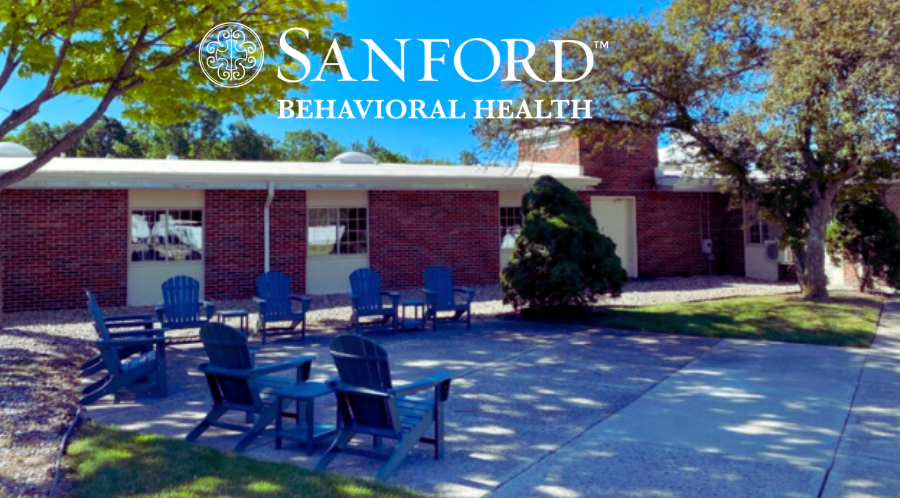
Weather permitting, we take the treatment outdoors at Sanford West Behavioral Health Campus.
What makes Sanford Behavioral Health unique?
Aaron Marshall – The evidence-based recovery approach. We are not trying to force-feed a treatment narrative down our patient’s throats. We look at each person as a whole. We have internal and external 12-step meetings, we explore healthy eating, fitness, and exercise, and we address all aspects of a person’s mental health.
What are the keys to successful outcomes?
Aaron Marshall – I wish I could give you A + B = C, and that’s what you have to do to stay sober forever.
Jordan Higby – Don’t put anything in front of your recovery. Nothing. I have patients who say my kids come first, but you are not going to have your kids or enjoy your kids unless you are sober.
Aaron Marshall – One big thing for success is staying in treatment. Stay as long as you can because the percentage for long-term recovery goes up and up the longer you stay. And get yourself in a situation where you need to be accountable for your actions. I had to step aside and let other people show me how to manage my life because I sure didn’t know how to. I think we’ve been selfish for so long in active addiction that it’s hard to say “no” in recovery. But to keep recovery on track, you might have to think of yourself first.
What about the pitfalls?
Aaron Marshall – I never like to disqualify a patient. But going back to a toxic environment is a bad idea. If you have a partner that’s using, you are basically going back to the same environment but expecting different results. They say in meetings, “If nothing changes, nothing changes,” which is a cliché but also true.
Jordan Higby – No aftercare planning. You say, “I’m not going to drink or do drugs anymore. I’m cured, and I think I can handle it from here, guys.” But I was that guy once, and it takes as long as it takes. We have to remember that they’re sick and not have a bias against relapsing behavior because that’s the illness, not them.
Aaron Marshall – We know it takes what it takes. And I don’t care if it’s the first time, the 10th time, the 100th time. If you’re willing to call me and say I want to try again, I’m willing to give you that chance. The Sanford Family Program helps to validate the family’s feelings and provides a safe space to share and connect with other families with the help of a clinician.
Is there anything else you would like to say?
Aaron Marshall – I always tell people that even if you’re in a state where you’re unsure whether you have a substance use disorder or not and you just want to inquire, pick up the phone and call. We’re not going to judge you.
Jordan Higby – The best gift you can give a family member is the fact that you’re alive and sober. I remember my dad telling me the best thing for him is to go to sleep at night and not worry if I am dead or alive. That is the greatest gift that I can give.
Aaron Marshall – I remember my first Christmas; I went to treatment in October, so Christmas was right around the corner. I remember feeling terrible because I couldn’t get my mom or brothers anything. They all said the same thing, “We couldn’t care less about the materialistic stuff you buy. The fact that you’re here and we know you’re sober and you’re OK is all that we need.” [Smiles] So, they get that every year now.
Happy New Year. You are inspirational!
Visit us online today to find out more about our comprehensive addiction treatment programs, or click the link below to schedule a free consultation.
